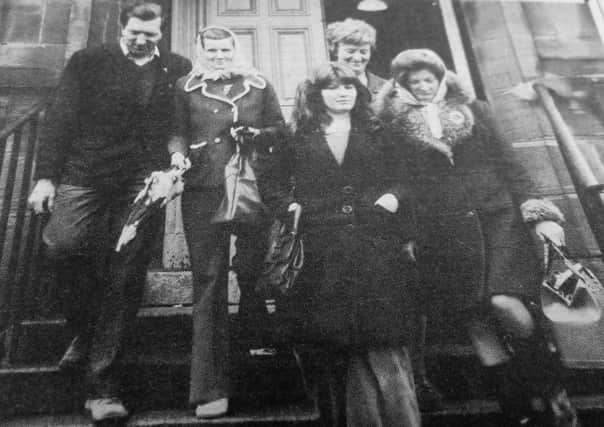Nostalgia: 1975 vote on the Common Market


So, it seems appropriate to reflect on the vote of 1975 – the UK’s first national referendum on whether to stay in what was then known as the Common Market, or pull out.
As Prime Minister, Ted Heath, took us into the EEC in 1973, but Labour’s 1974 manifesto included a commitment to give the people the choice to stay on re-negotiated terms, or leave.
Advertisement
Hide AdAdvertisement
Hide AdWhen Harold Wilson moved into 10 Downing Street, the wheels were set in motion for a referendum.
He won the day with 67 per cent voting yes, but it was a bruising battle even within his own party – the Cabinet was split, and prominent politicians such as Michael Foot and Tony Benn were firmly in the ‘no’ camp.
Ironically, the Tories campaigned to stay in – how times have changed!
Locally the debate was robust.
The Fife Free Press reported strong support from industry to stay in Europe.
Advertisement
Hide AdAdvertisement
Hide AdIn the week leading up to the referendum, it canvassed the views of all the leading manufacturers in town, and reported an “emphatic Yes to Europe.”
Nairn Williamson, one of the town’s biggest employers had just laid off 75 workers, and said exiting Europe would be bad for business.
Willie Roxburgh, chairman and managing director, said no other market offered the same opportunities, and to quit Europe would “damage our business and the prospects of all our employees.”
At Nelbarden Swimwear, which was based at Mitchelston Industrial Estate, the message was the even more stark. The company exported 40 per cent of its output with a quarter of that going to Europe.
Advertisement
Hide AdAdvertisement
Hide AdLeo Addison, managing director said: “I don’t think we’d go bankrupt, but it would certainly put the whole operation in jeopardy.
“I say quite frankly that if we do pull out, the people responsible will have signed a death warrant as far as employment is concerned.”
Mr Addison was also president of Kirkcaldy and East Fife Chamber of Commerece which was in favour of staying in the EEC.
At Butler Buildings, John Walters, marketing services manager said there was no question it had to be a yes vote, with one third of his factory’s output going to Europe.
Advertisement
Hide AdAdvertisement
Hide AdCarron Langdale doubled exports in 1974 and aimed to do even better, while British Aluminium Company (BAC) in Burntisland highlighted its international markets and believed prosperity came from staying in Europe.
AH McIntosh said it wouldn’t be affected greatly either way, but its MD Robert W Adams said he was voting to stay, but Tullis Russell was clear – the survival of the papermaking industry, which had a 1500-strong workforce, hinged on a yes vote.
Not so, said the Get Britain Out campaign which took to the stage at Templehall for a public meeting.
Brian Hill, organiser, said only those in big business would benefit from staying, and he felt the EEC was trying to be a third superpower – and even claimed a vote for the Common Market would mean the return of conscription as it sought to build a European army to match those of Russia and America.
Advertisement
Hide AdAdvertisement
Hide AdThe ‘No’ campaign was also spearheaded by prominent Labour politicians who took over the Adam Smith Halls for a well-attended meeting.
The platform included “the big guns” according to the Fife Free Press – Norman Buchan, former Labour Minister of State, and local MP, Harry Gourlay
Buchan accused pro-EEC campaigners of spreading fear over what a ‘No’ vote would mean – echoes of the Scottish independence referendum? – while Mr Gourlay said the more he had visited “the glass houses in Brussels” the greater degree of dislike he had for the commission’s method of operation.
As for the Press, it backed the yes campaign.
A rare front page editorial described the referendum as “at best an act of political expediency and, at worst, a an act of political cowardice”
Advertisement
Hide AdAdvertisement
Hide AdIt noted the two hot topics of debate were jobs – and food prices.
It said the EEC “gives us an opportunity – an opportunity we must grasp with both hands – if we are to extricate from the present socio-economic difficulties of our own making.
‘‘Britain, and Britain alone, is the master of her own destiny, her own fare and her own future – and the sooner we realise that, the better.”
It rained heavily on the day of the vote, and the result wasn’t known until the following day.
Advertisement
Hide AdAdvertisement
Hide AdFife voted yes by 19,000 votes – 84,000 (56 per cent) to 65,000 on a turnout of 63 per cent of the population.
The final word went to Get Britain Out.
Mr Hill said it was a tragedy, and warned: “This will go down in history as ‘Black Thursday.”
We never did get conscription though ...